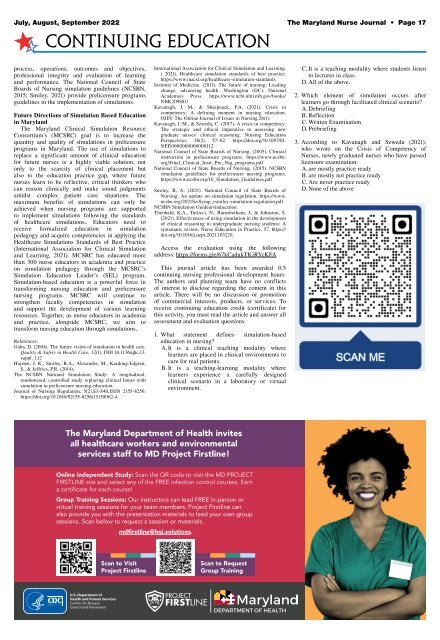Maryland Nurse Journal - July 2022
Create successful ePaper yourself
Turn your PDF publications into a flip-book with our unique Google optimized e-Paper software.
<strong>July</strong>, August, September <strong>2022</strong> The <strong>Maryland</strong> <strong>Nurse</strong> <strong>Journal</strong> • Page 17<br />
Continuing Education<br />
process, operations, outcomes and objectives,<br />
professional integrity and evaluation of learning<br />
and performance. The National Council of State<br />
Boards of Nursing simulation guidelines (NCSBN,<br />
2015; Smiley, 2021) provide prelicensure programs<br />
guidelines in the implementation of simulations.<br />
Future Directions of Simulation Based Education<br />
in <strong>Maryland</strong><br />
The <strong>Maryland</strong> Clinical Simulation Resource<br />
Consortium’s (MCSRC) goal is to increase the<br />
quantity and quality of simulations in prelicensure<br />
programs in <strong>Maryland</strong>. The use of simulations to<br />
replace a significant amount of clinical education<br />
for future nurses is a highly viable solution, not<br />
only to the scarcity of clinical placement but<br />
also to the education practice gap, where future<br />
nurses learn to be reflective, critical thinkers who<br />
can reason clinically and make sound judgments<br />
amidst complex patient care situations. The<br />
maximum benefits of simulations can only be<br />
achieved when nursing programs are supported<br />
to implement simulations following the standards<br />
of healthcare simulations.. Educators need to<br />
receive formalized education in simulation<br />
pedagogy and acquire competencies in applying the<br />
Healthcare Simulations Standards of Best Practice<br />
(International Association for Clinical Simulation<br />
and Learning, 2021). MCSRC has educated more<br />
than 300 nurse educators in academia and practice<br />
on simulation pedagogy through the MCSRC’s<br />
Simulation Education Leader’s (SEL) program.<br />
Simulation-based education is a powerful force in<br />
transforming nursing education and prelicensure<br />
nursing programs. MCSRC will continue to<br />
strengthen faculty competencies in simulation<br />
and support the development of various learning<br />
resources. Together, as nurse educators in academia<br />
and practice, alongside MCSRC, we aim to<br />
transform nursing education through simulations.<br />
References:<br />
Gaba, D. (2004). The future vision of simulation in health care.<br />
Quality & Safety in Health Care, 12(1). DOI 10.1136/qhc.13.<br />
suppl_1.i2<br />
Hayden, J. K., Smiley, R.A., Alexander, M., Kardong-Edgren,<br />
S., & Jeffries, P.R. (2014).<br />
The NCSBN National Simulation Study: A longitudinal,<br />
randomized, controlled study replacing clinical hours with<br />
simulation in prelicensure nursing education.<br />
<strong>Journal</strong> of Nursing Regulation, 5(2),S3-S40,ISSN 2155-8256.<br />
https://doi.org/10.1016/S2155-8256(15)30062-4.<br />
International Association for Clinical Simulation and Learning.<br />
( 2021). Healthcare simulation standards of best practice.<br />
https://www.inacsl.org/healthcare-simulation-standards<br />
Institute of Medicine. (2011). The future of nursing: Leading<br />
change, advancing health. Washington (DC): National<br />
Academies Press. https://www.ncbi.nlm.nih.gov/books/<br />
NBK209881/<br />
Kavanagh, J. M., & Sharpnack, P.A. (2021). Crisis in<br />
competency: A defining moment in nursing education.<br />
OJIN: The Online <strong>Journal</strong> of Issues in Nursing,26(1).<br />
Kavanagh, J. M., & Szweda, C. (2017). A crisis in competency:<br />
The strategic and ethical imperative to assessing new<br />
graduate nurses' clinical reasoning. Nursing Education<br />
Perspectives, 38(2), 57–62. https://doi.org/10.1097/01.<br />
NEP.0000000000000112<br />
National Council of State Boards of Nursing. (2005). Clinical<br />
instruction in prelicensure programs. https://www.ncsbn.<br />
org/Final_Clinical_Instr_Pre_Nsg_programs.pdf<br />
National Council of State Boards of Nursing. (2015). NCSBN<br />
simulation guidelines for prelicensure nursing programs.<br />
https://www.ncsbn.org/16_Simulation_Guidelines.pdf<br />
Smiley, R, A. (2021). National Council of State Boards of<br />
Nursing: An update on simulation regulation. https://www.<br />
ncsbn.org/2021SciSymp_rsmiley-simulation-regulation.pdf<br />
NCSBN Simulation Guideursinducation<br />
Theobald, K.A., Tutticci, N., Ramsbotham, J., & Johnston, S.<br />
(2021). Effectiveness of using simulation in the development<br />
of clinical reasoning in undergraduate nursing students: A<br />
systematic review. <strong>Nurse</strong> Education in Practice, 57. https://<br />
doi.org/10.1016/j.nepr.2021.103220.<br />
Access the evaluation using the following<br />
address: https://forms.gle/67kCadukTKiRYcKFA<br />
This journal article has been awarded 0.5<br />
continuing nursing professional development hours.<br />
The authors and planning team have no conflicts<br />
of interest to disclose regarding the content in this<br />
article. There will be no discussion or promotion<br />
of commercial interests, products, or services. To<br />
receive continuing education credit (certificate) for<br />
this activity, you must read the article and answer all<br />
assessment and evaluation questions.<br />
1. What statement defines simulation-based<br />
education in nursing?<br />
A. It is a clinical teaching modality where<br />
learners are placed in clinical environments to<br />
care for real patients.<br />
B. It is a teaching-learning modality where<br />
learners experience a carefully designed<br />
clinical scenario in a laboratory or virtual<br />
environment.<br />
C. It is a teaching modality where students listen<br />
to lectures in class.<br />
D. All of the above.<br />
2. Which element of simulation occurs after<br />
learners go through facilitated clinical scenario?<br />
A. Debriefing<br />
B. Reflection<br />
C. Written Examination<br />
D. Prebriefing<br />
3. According to Kavanagh and Szweda (2021),<br />
who wrote on the Crisis of Competency of<br />
<strong>Nurse</strong>s, newly graduated nurses who have passed<br />
licensure examination:<br />
A. are mostly practice ready<br />
B. are mostly not practice ready<br />
C. Are never practice ready<br />
D. None of the above<br />
The <strong>Maryland</strong> Department of Health invites<br />
all healthcare workers and environmental<br />
The CDC-developed training materials are FREE and were<br />
services staff to MD Project Firstline!<br />
designed to meet your learning style.<br />
Online Independent Study: Scan the QR code to visit the MD PROJECT<br />
FIRSTLINE site and select any of the FREE infection control courses. Earn<br />
a certificate for each course!<br />
Group Training Sessions: Our instructors can lead FREE in-person or<br />
virtual training sessions for your team members. Project Firstline can<br />
also provide you with the presentation materials to lead your own group<br />
sessions. Scan below to request a session or materials.<br />
mdfirstline@hqi.solutions.<br />
Scan to Visit<br />
Project Firstline<br />
Scan to Request<br />
Group Training

















